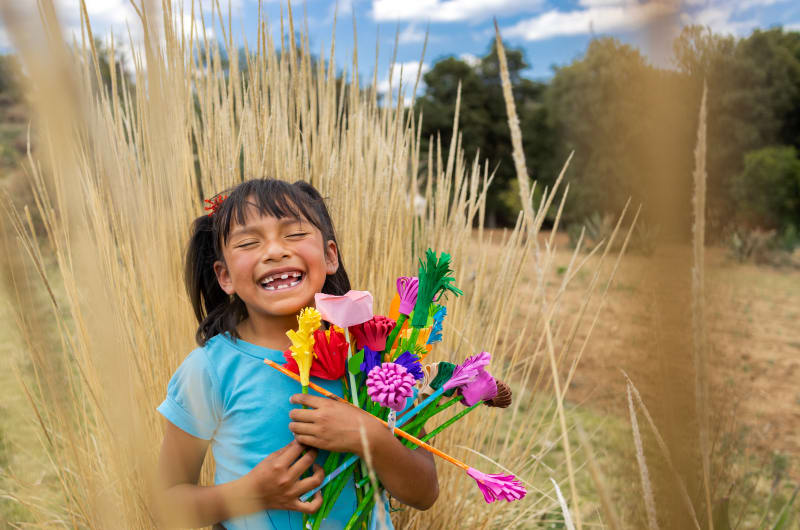Bobita dreams of becoming a teacher in her community. She believes in the power of education to change a life, a family and a community. She believes this because she stands at the cusp of this change herself—a future free from poverty and hunger is within her grasp.
Bobita is 18 years old and preparing for her upcoming grade 12 board exams. She’s the first in her family to take a board exam and her parents, Manno and Koisoila, are cheering her on. Manno, her father, says the idea that his daughter will be a teacher fills him with pride and hope.
“It just warms my heart to think my girls won’t be tea field workers like me when they’re ready to work,” says Manno.
Both of Bobita’s parents work at the tea fields, earning 120 Bangladeshi takas (CAD $1.74) each day for producing 23 kilograms of tea leaves. It’s hard work, and it has been difficult to stretch what they earn to ensure Bobita and her two siblings have sufficient food, clothing and shelter.

Bobita stands with her textbooks.
“I am proud of my parents, who work so hard for me and my siblings. I am grateful that they have their full confidence in me,” says Bobita.
Bobita’s dream is important to her family. Her parents will go to any lengths to see her become the first high school graduate in the family. But as food prices began sharply rising, Bobita’s future started feeling more out of reach. Even so, her parents continued to support her in every way possible, even if it meant sacrificing portions of their meals to save for her education.
The floodwaters rise
With hard work and sacrifice, the family’s dreams were edging closer. But with food insecurity on the rise and inflation in their community, Bobita’s parents’ wages weren’t adding up to cover the costs of their basic needs anymore. Especially after the community was hit with extreme weather, one of the factors contributing to the global food crisis.
First, flash floods hit the northeastern region of the country. The national highway was blocked, the electricity went out, the cellphone network was disrupted, schools were closed and shops were unable to open. Many people were unable to get out of their homes. People had to wait for an entire week for the water to recede.

Bobita considers her future.
That first wave of flooding hit the region in May. As damaging as it was, it was minor compared to the second wave in June, which crippled the entire town.
Luckily for Bobita, her home was not flooded, but her village was cut off from food supplies. Suddenly, her family, along with many others, were forced into food insecurity. For Bobita, it felt like she had to choose between food and her future.
But the local Compassion centre was there amidst the crisis. They immediately began to distribute emergency food packs to families like Bobita’s.

Bobita walks through a rice field in her community.
“We knew that the community couldn’t afford to manage supplies, so we were the first responders, giving supplies of dry food to the community during the flood,” says Pius, the local Compassion centre director.
A wave of food insecurity and risk of hunger
While Bobita took care of her sisters at home, her parents went out in search of work because of the crisis. Thanks to their efforts, the family managed to survive the effects of the flooding. But unfortunately, even greater hardship was to follow.
Inflation set in rapidly. According to The Daily Star, a local news source, the price of commodities such as fruit and vegetables increased by 10–27 per cent on average. The increasing costs have affected every level of society.

Pius, the director at Bobita’s Compassion centre.
“Having supplied toiletries and food items to the Compassion centre for the past few years, it hurts me to sell at such high rates—but, in the current situation, if I don’t sell at this rate, I will go bankrupt,” says Junaid, the local grocer.
These rising costs are another contributing factor to the global food crisis. This created a wave of food insecurity and hunger that has flooded Bangladesh, especially in communities like Bobita’s, where families earn meagre wages and even small price rises have big consequences.
“Normally we used to have two meals a day—one in the morning and another late in the evening. But now, it is out of my understanding what consequences we will have to face,” says Bobita.

Junaid, a local grocer in Bobita’s community.
Sacrifices and solutions to combat hunger
In such a dire situation, providing families with food relief is urgent. The Compassion Bangladesh national office is strategizing to analyze the needs of families at the Compassion centres and supply critical food supplies so that families can survive.
The global food crisis is personal for Bobita and her family. Her dream of becoming a teacher and breaking the cycle of poverty is on the line. Every day, Bobita’s parents must make incredible sacrifices because they must choose between food and their daughter’s future.

Bobita standing with her father, Manno, and her two younger sisters, Kobita (left) and Sobita (right).
The emergency food packs that the local Compassion centre has provided help bring much-needed relief to Bobita’s family by ensuring there is food on the table. But these food packs do more than just fill hungry bellies in Bobita’s home—they are an essential part of building a future free from poverty. With support from the Compassion centre and the tangible expression of love delivered with each emergency food pack, Bobita can continue working towards her dream of becoming a teacher. She has food and a future.

Bobita has food and a future.
When you give the gift of an Emergency Food Pack, you are feeding a family and investing in a future free from poverty.
Your compassion can give a child food and a future.
Field reporting and photos by J. Sangma.





